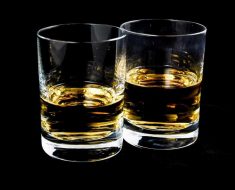She’ll drink to that: Women ‘are better judges’ of wine than men and have more discerning palates, study finds
- Women more likely to describe themselves as feeling ‘joyful’ when drinking
- Researchers asked male and female volunteers to take part in blind testing
- 208 volunteers took part in the research by Technical University of Madrid
Women are better at telling the differences between wine and have more discerning palates, a study suggests.
It also found that they were more likely to describe themselves as feeling ‘joyful’ when drinking white wine than men.
Spanish researchers asked male and female volunteers to take part in a blind-tasting of six varieties and describe their feelings as well as the quality of the wine. They found that women were also better able to discriminate between different tastes.
A total of 208 volunteers took part in the research, which was conducted by the Technical University of Madrid.

A total of 208 volunteers took part in the research, which was conducted by the Technical University of Madrid (stock image)
RELATED ARTICLES
- Previous
- 1
- Next
-

Australian man and his British partner who died while trying…
Wetherspoons will stop selling French Champagne and German…
Share this article
Dr Carolina Chaya, who led the study, said that when it came to evaluating their feelings, compared to men, women reported ‘significantly higher scores for joyful when consuming white wines, and lower scores when consuming red wines’.
In addition, she said that women reported greater differences between the wines, noticing more differences between the wines than the men.
The volunteers were asked to take part in a blind-tasting of six wines – two whites, one rose, and three reds – of four different grape varieties. Graded by professionals, the wines were less than five years old, and had an alcoholic strength of around 13 per cent. After sampling each one, the volunteers were asked about the quality of the wine and the feelings it evoked.

In addition, she said that women reported greater differences between the wines, noticing more differences between the wines than the men (stock image)
A further finding was that older drinkers drank to remember, and the young to forget. She said: ‘Young adults drink wine for reasons related to disinhibition and social status, while older people use it as a social catalyst, to evoke memories and traditions.’
Overall, the report in the journal Food Quality and Preference found that the young also felt less guilt about drinking than older tipplers.
She wrote: ‘Young adults – under 35 years old – felt less guilty than middle-aged adults, when consuming any of the wines. This could be linked to an increase in health concerns when the age of consumers increases.’
Magnets could boost flavour
Wine could be made to taste better with magnets, drawing out foul-smelling chemicals that ruin a bottle of plonk, researchers found.
A method developed by Australian scientists used tiny magnetic particles to remove unwanted chemicals from wine, and eliminated off-tasting substances without altering its bouquet, according to a study published in the Journal of Agricultural and Food Chemistry.
All wines naturally contain molecules that contribute to their distinctive flavours and aromas. One group, MPs (or alkylmethoxypyrazines), smells like vegetables in certain wines, overwhelming the bouquet. Researchers utilised magnetic ‘nanoparticles’ in order to isolate the MPs in a bottle of cabernet sauvignon. A group of taste testers said the approach removed these molecules without damaging the wine’s distinct aroma intensity.
Study leader Professor David Jeffery, of Adelaide University, said there was ‘a lot to be done’ before regulators would allow the method to be applied to the winemaking process, but it could be tailored to remove chemicals other than MPs.
Source: Read Full Article





